- Science
- Clinical Trials
- Guide to Clinical Trials Your participation makes a difference
- Clinical Trials in Children Designed to improve kids' health
- Data and Results Sharing our Results
- Integrity and Transparency Building Trust
- Diversity Equity and Representation
- Plain Language Study Results Trial Result Summaries
- Expanded Access & Compassionate Use Possible Treatment Options
- Find a Trial
- Areas of Focus
- Rare Disease Smaller populations but big impact
- Internal Medicine Extending lifespans worldwide
- Inflammation & Immunology Treatment at the molecular level
- Vaccines Preventing the spread of infections
- Oncology The science of optimism
- Anti Infectives Combatting an evolving risk
- Areas of Innovation
- Gene Therapy Breakthroughs become treatments
- Medicinal Sciences The next generation of science
- Precision Medicine Developing tailored medicines
- Maternal Immunization Protecting newborns at the start
- mRNA Technology Unleashing the next wave of scientific innovations
- Diseases & Conditions
- Coronavirus Resources
- Product Pipeline
- Research Sites
- Clinical Trials
- Products
- How Drugs are Made
- Branded vs. Generic Learn the difference
- Biologics & Biosimilars Cures found in nature
- Commitment to Quality Maintaining the highest standards
- Global Supply Strategic manufacturing locations
- Manufacturing Sites Where medicine is made in the U.S.
- Medicine Safety
- Health Literacy Learning to be well
- Treatment Choices Learning about treatment decisions
- Partnering With Patients Helping others by reporting side effects
- Tips for Patients Preventing medication errors
- Reporting Adverse Events
- Counterfeiting Preventing medication errors
- Product Safety
- Product List
- Product Contacts
- PfizerPro for Professionals
- Patient Assistance Programs
- Distributors
- How Drugs are Made
- Stories
- Newsroom
- About
- People
- Executives Our senior-most leadership
- Board Members The people steering our company
- Scientists Our experts making discoveries
- Patient Stories Our patients
- Colleague Stories Our colleagues
- Responsibility
- Ethics & Compliance Each of us is responsible
- Responsible Business Breakthroughs that change patients’ lives
- Patient Advocacy & Engagement Putting Patients First
- Global Impact Meeting urgent needs worldwide
- Diversity, Equity, and Inclusion Everyone has something to offer
- Environmental Sustainability Our responsiblity to the environment
- Human Rights Furthering dignity and worth
- Health & Safety
- Intellectual Property The benefits of fair competition
- EHS Governance
- Misinformation
- Programs & Policies
- Grants Support for independent research
- Political Partnership Supporting like-minded organizations
- Working with Healthcare Professionals Collaboration to improve lives
- Prescription Value & Pricing How to lower patient costs
- Privacy Principles Commitment to personal data privacy
- Ready for Cures Improving Access to Medicines
- Transparency in Grants Committed to Disclosure
- Policy Positions
- Investors
- Investors Overview Information for stockholders
- Why Invest Why to join us in our mission
- Events & Presentations Calendar of upcoming events
- Financial Reports Quarterly reports and more
- Investor News Announcements about our performance
- Stock Information Charts and data
- Shareholder Services Information on stock transactions
- Corporate Governance
- Corporate Governance Overview Gaining insight into our performance
- Board Committees & Charters Defining the corporate structure
- The Pfizer Board Policies Ensuring ethical leadership
- Corporate Governance FAQs Learn more about our approach
- Contact Our Directors Email any of our Directors
- Purpose
- History
- Careers
- Partners
- People
What have you heard about health literacy?
What have you heard about health literacy?
Health Literacy is a way of describing the skills we need to look after our health. It plays an important role in how we are able to understand and act on health information. Low health literacy can affect anyone and many people find health information difficult or confusing. Pfizer has taken an important role in promoting clear health communication.
We support healthcare professionals and patients with resources and tools to encourage better health conversations that may help improve outcomes for patients.
Health Literacy
What it is and why it matters.
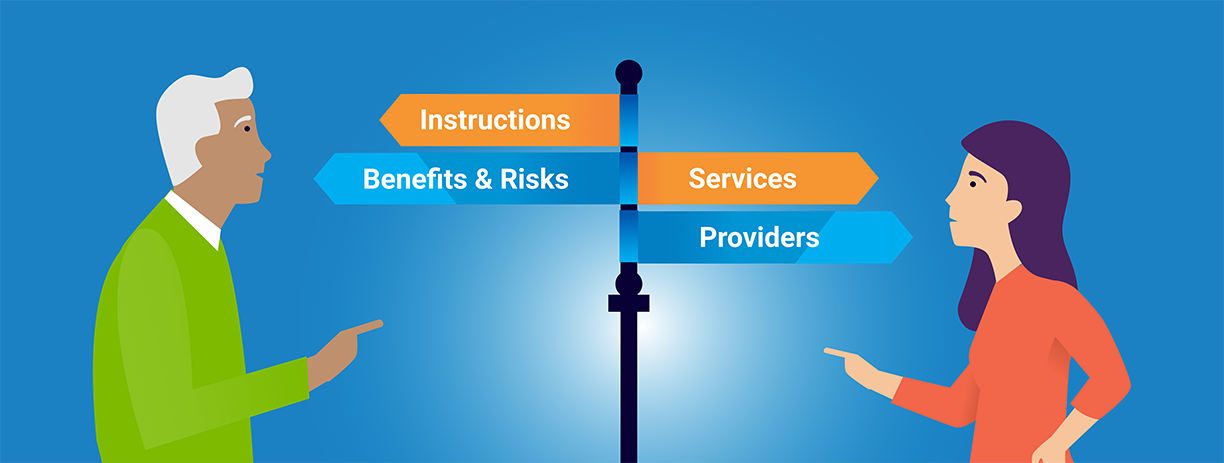
Taking care of our health is a part of life, not just when we visit a clinic or hospital. Health literacy can help us protect our health, understand health problems, and perhaps avoid or manage some of them.1
What is health literacy?
Health literacy is a measure of how patients get health information and services, understand them, and use them.
Health literacy is different from literacy, which is a person’s reading and writing skills. Health literacy also includes math skills and knowledge of health topics and the human body.5
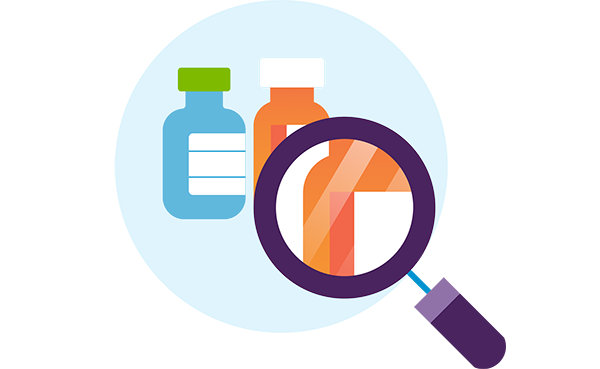
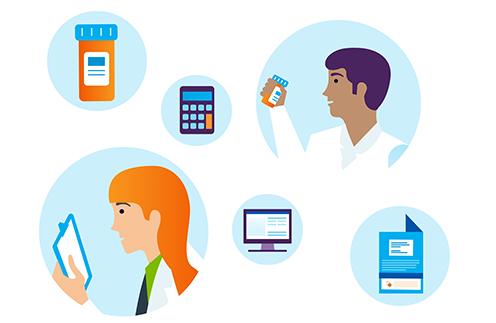
Health literacy depends on individual factors as well as the healthcare system.
Medical or technical words may be unfamiliar, but patients can continue to learn new terms and health topics.
By improving health literacy, patients may be able to make better choices about their health.2
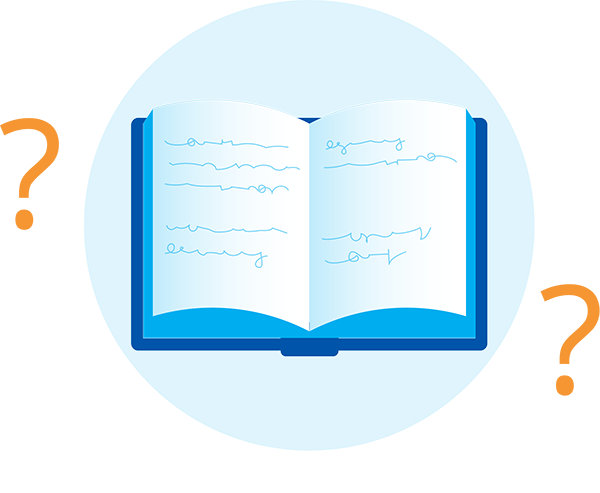
Improving Health Literacy
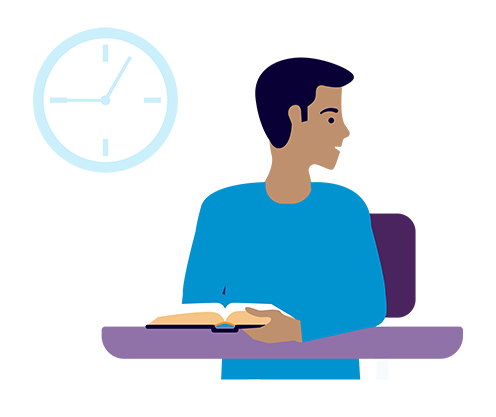
Health information can feel difficult and confusing.
What people learn about health information may be incomplete and often becomes outdated.7

Nearly 9 out of 10 adults may not have received the health literacy tools needed to manage their health.
Improving Health Literacy May Help Patients:
- Improve health outcomes and quality of care and lower healthcare costs.
- Find a healthcare provider, like a primary care doctor, specialist, or a service, like a mammogram or an X-ray.
- Fill out complicated medical forms.
- Share information with the healthcare team.
- Understand treatment options and their benefits and risks.
- Work with other members of the healthcare team to decide on a treatment plan.
- Manage treatment options, set goals, and ask questions
Improving health literacy is the job of the entire healthcare team.
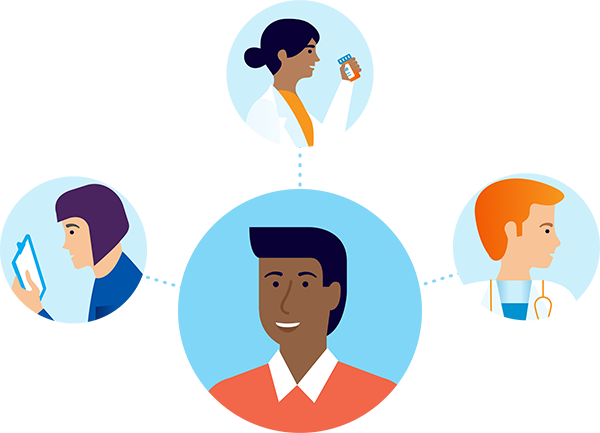
What can you, the patient, do to improve your health literacy? 11
When you visit your healthcare provider, start with these three simple questions 12, 13

What is my main health problem?
What do I need to do?
Why is it important for me to do this?
Don’t be afraid to ask your healthcare professionals to explain something again.
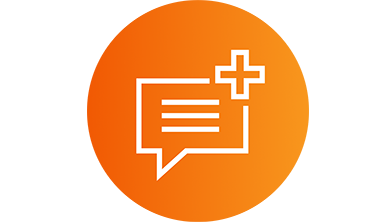
If the doctor, nurse, pharmacist, or other member of the healthcare team says something you do not understand––let them know!
If English is not your main language, tell your healthcare team.

Ask your healthcare team to give you educational materials to read or watch.
Take the first step with this article on getting to know your healthcare team
Resources for healthcare professionals
Continue to “encourage patients and their families to feel comfortable enough to speak up about any concerns they have about errors or the quality of care they are receiving.”
--The Joint Commission
Clear health communications between healthcare professionals and patients can help to improve health literacy and understanding.15
Techniques that healthcare professionals can use include: 2,16

Speak in plain language and avoid technical terms
Focus on key information needed for the visit
Let the most important points come first
Ask open-ended questions
Encourage patients to write down their questions before their appointments
Make information relevant to the patient’s culture
Use language services for those who don’t speak
English as their main language
Work together with patients to set goals and make shared decisions
Suggest patients bring a trusted person to appointments, such as a close friend or family member17
Distribute plain-language educational materials and connect patients with supportive resources such as advocacy groups
Ask patients to share information learned or plans made by teaching them back to you
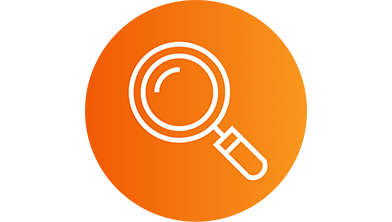
The “Newest Vital Sign” tool to help you assess your patients’ health literacy is available by clicking on the link below.
Click here for the newest vital sign tool DetailsSOURCES
1https://www.cdc.gov/healthliteracy/learn/Understanding.html
2www.health.gov/communication/literacy/powerpoint/default.htm
3www.health.gov/communication/about.asp
4www.who.int/healthpromotion/conferences/7gchp/track2/en/
5www.health.gov/communication/literacy/quickguide/Quickguide.pdf
6www.health.gov/communication/literacy/issuebrief/
7https://health.gov/communication/literacy/quickguide/factsbasic.htm
8Apter, A. J. 2013. Numeracy in health care: A clinician’s perspective. Presentation at the Institute of Medicine Workshopon Health Literacy and Numeracy, Washington, DC, July 18.
9www.nap.edu/read/11623/chapter/2#7
10www.ahrq.gov/professionals/education/curriculum-tools/shareddecisionmaking/tools/tool-4/index.html
11www.pfizer.com/health/literacy/patients-and-families/what-can-patients-families-do/what-can-you-do
12www.npsf.org/page/askme3
13www.ahrq.gov/patients-consumers/patient-involvement/ask-your-doctor/index.html
14https://www.jointcommission.org/assets/1/18/improving_health_literacy.pdf
15Komondor K. 5 things for health providers-Health literacy journey at St. Vincent Medical Center; Powerpoint presentation,Institute of Medicine Workshop on Organizational Change to Improve Health Literacy; Washington, DC. April 11.2013
16www.health.gov/communication/interactiveHLCM/
17https://jamanetwork.com/journals/jama/fullarticle/1104329
